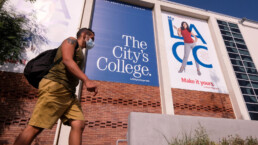As a policy it’s been dismissed, trivialized, and now back-burnered by a sympathetic President. But it would be a game-changer.
By Nora-Kathleen Berryhill, The Progressive Magazine
When Joe Biden became the Democratic presidential nominee in 2020, he sat down with the runner-up, Senator Bernie Sanders, Independent of Vermont, and created the Biden-Sanders Unity Task Force to merge some of Sanders’s most popular policy proposals into Biden’s comparatively moderate platform. Co-chaired by U.S. Representative Alexandria Ocasio-Cortez, Democrat of New York, and former Secretary of State John Kerry, the task force produced 110 pages of progressive policy recommendations, ranging from establishing a $15 federal minimum wage and universal health care, to calling for better federal oversight of police and adopting a climate framework similar to Ocasio-Cortez’s “Green New Deal.”

Collaboration with progressives also pushed Biden to take a slightly bolder stance on the higher-education affordability crisis. As Sanders’s campaign push in the 2020 primaries to cancel student debt and make public universities and colleges free was a major mobilizing force among young voters, Biden promised to cancel $10,000 of federal student loan debt per person and to make both two- and four-year public colleges and universities free for students with family incomes under $125,000.
These policies went further than some expected, but they weren’t revolutionary. After all, broad bipartisan support already existed for a more expansive approach than what Biden proposed: An estimated 63 percent of Americans (and, notably, 52 percent of Republicans under fifty who have not completed a college degree) believe that public colleges and universities should be made tuition-free for all U.S. students. And advocacy groups urged President Biden to adopt a bicameral resolution by Democratic lawmakers in February 2021 to cancel $50,000 in student loans for federal borrowers.
Recent Posts
‘Unconstitutional. Unethical. Authoritarian.’ ICE Bars Millions Of Immigrants From Bond Hearings
July 18, 2025
Take Action Now One watchdog said the new policy “seems like a blatant attempt to stop them from exercising their right to due process.”……
Americans Are Not Nearly Alarmed Enough About Climate Change
July 18, 2025
Take Action Now Americans still don’t comprehend how imminent, dangerous, and far-reaching the threat is—and journalists are partly to blame.By…
The IRS Is Building A Vast System To Share Millions Of Taxpayers’ Data With ICE
July 17, 2025
Take Action Now ProPublica has obtained the blueprint for the Trump administration’s unprecedented plan to turn over IRS records to Homeland Security…
Israel’s Sudden Assault On Syria Is Unchecked Aggression
July 17, 2025
Take Action Now Jerusalem is bombing Damascus and threatening al-Sharaa’s rule, while Washington was hoping to help the nascent government on…




